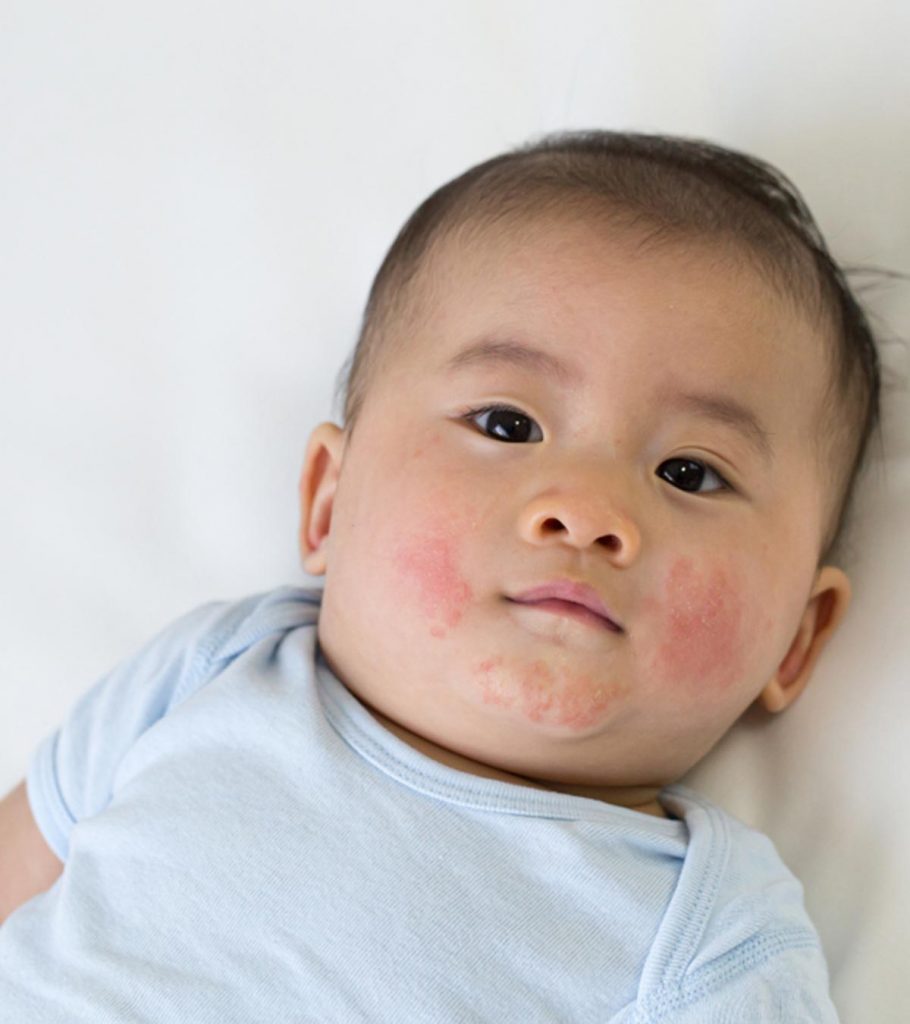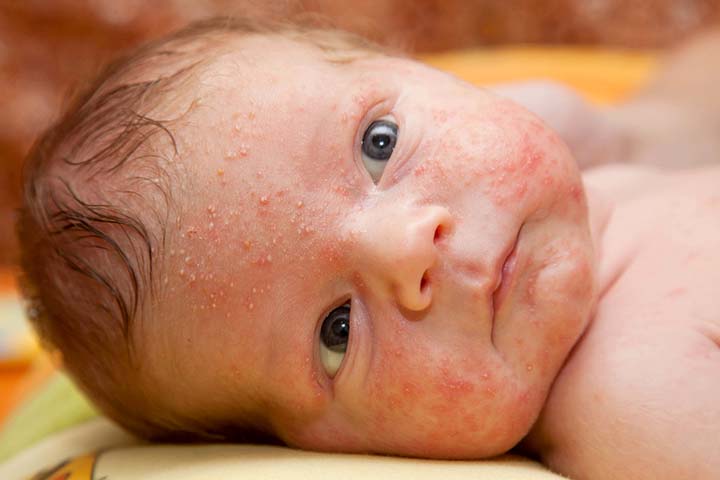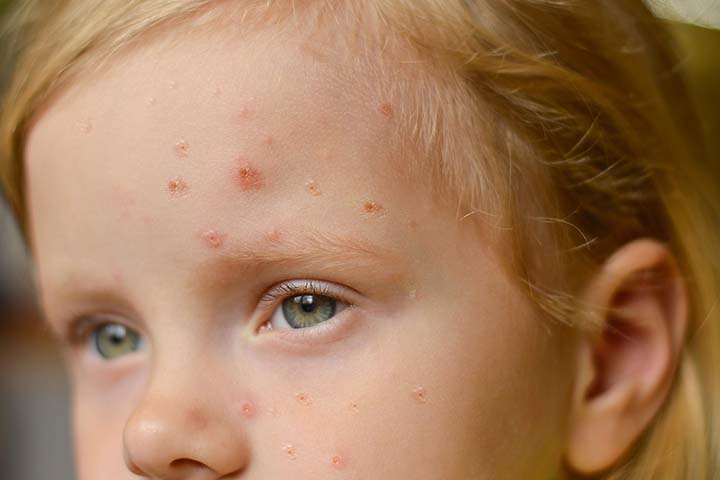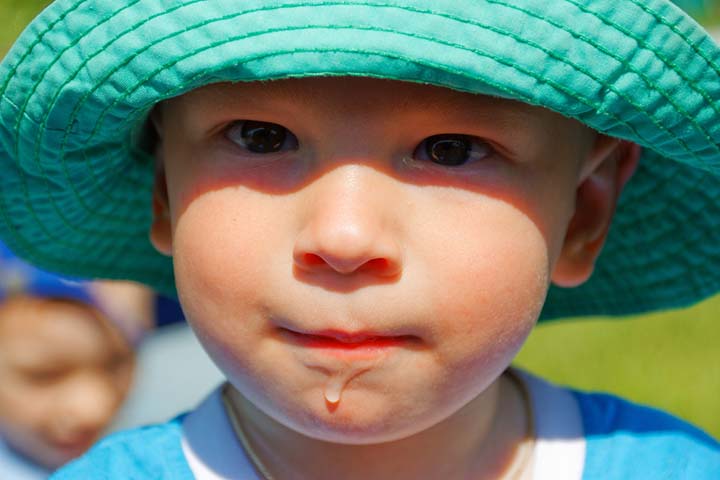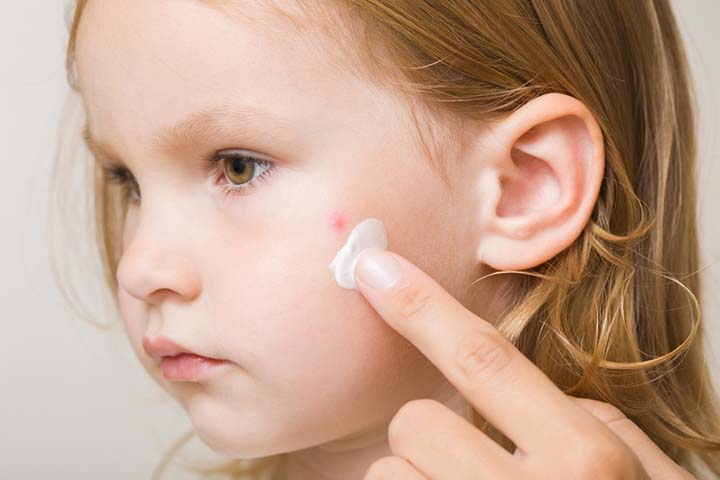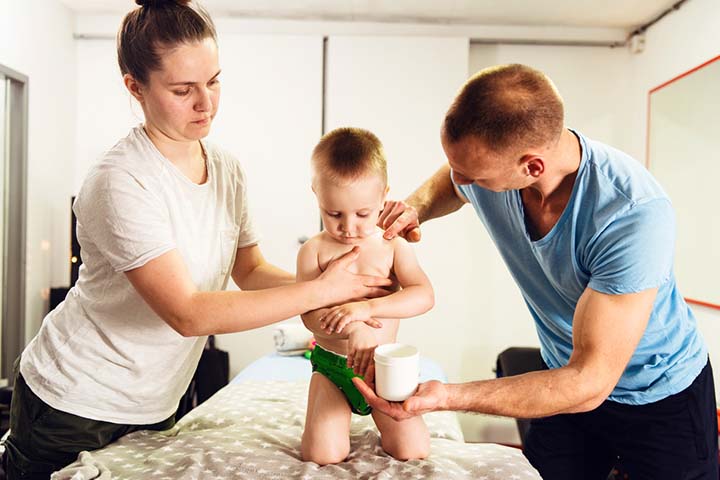While acne is common in adults, toddler acne is rare. It is a chronic inflammatory skin disease of sebaceous glands (oil-producing cells). These oil glands are located at the base of hair follicles (1). Extra skin cells and oil may combine to block the hair follicle’s opening, which in turn plugs the oil glands leading to bacterial growth and multiplication, and eventually causing pimples or blemishes (2). Read on to know more about the causes, symptoms, treatment, and tips to reduce and prevent acne in toddlers.
Is Acne Common In Toddlers?
Acne can occur in toddlers, but it is rare (3).
Pediatric acne is divided into five subgroups (4).
- NeonataliXRelating to a child under 28 days of age acne
- Infantile acne
- Mid-childhood acne
- Preadolescent acne
- Adolescent acne
Toddler acne falls in the mid-childhood acne category.
Symptoms Of Acne In Toddlers
Mid-childhood acne is usually seen in the age group of one to seven years. The following are the symptoms of acne in toddlers.
- Red raised inflammatory papules on the skin surface
- Painful bumps
- Lesions mostly on the face, chest, and back
- Lesions appearing as open or closed comedo, which is commonly known as blackheads or whiteheads, respectively
- Inflammatory papules and pustulesiXA small pus-containing bump on the skin
Causes Of Acne In Toddlers
Acne usually happens due to the circulation of adrenaliXRelating to two glands situated above the kidneys and gonadaliXRelating to reproductive glands like ovaries or testisandrogeniXA male sex hormone hormones in the blood (3). The secretion of androgens is usually low in children of one to seven years old. However, some substances or conditions might trigger the secretion of androgens. The following are some commonly seen reasons for acne in toddlers.
1. Dairy intake
Dairy intake has been proven to increase the incidence of acne in people between the ages of seven to 30years. It is believed that dairy, especially butter and cheese, intake can cause acne in toddlers, too. However, more research needs to be done to establish the relation of dairy consumption in toddler acne (1).
2. Irritants
Some irritants from soap or cleansers might trigger acne in toddlers with sensitive skin. This is much more common than many other triggers. Some skin lotions can also be irritants and may cause redness in sensitive skin. Skin irritation can also be caused by air fresheners, soaps, or lotions that are heavily perfumed.
3. Medicines
The use of medicines like antidepressants, birth control pills, steroidsiXSynthetic version of hormones produced by adrenal glands, etc., by breastfeeding mothers can cause acne in toddlers. However, there is limited research to establish a correlation.
4. Dietary changes
Dietary changes in a mother’s food might also cause skin problems leading to acne breakout in toddlers.
5. Hormones from maternal breast milk
Some researchers believe that the hormonal disturbances in the mother might get passed to babies via breast milk. However, this requires further research (5).
Drooling of saliva from the baby’s mouth can lead to inflammation, eventually causing acne. Also use of rough fabric may irritate the sensitive skin of the baby.
In some toddlers, the acne might happen due to hormonal changes. The doctor might recommend blood tests in case hormonal abnormalities are suspected to be the cause (3).
Acne could also be caused due to genetics. If your child has a family history of acne, there is a likelihood that they may develop acne too.
How Is Acne In Toddlers Diagnosed?
The doctor usually examines the toddler’s skin to diagnose acne in a toddler. There is no definite test to diagnose acne. However, the doctor may ask questions about the child’s medical history and diet. Since acne in toddlers is a harmless condition, there will not be any test unless there are any other additional symptoms.
How Do You Treat Acne in Toddlers?
Acne does not need treatment in toddlers. It is a self-limiting condition and resolves by itself. Treatment might be required only in a few rare cases. Dr. Anna H. Chacon, a board-certified dermatologist from Miami, Florida, says, “You should contact a doctor if your child has moderate-to-severe acne, painful cysts, or scars.” Establishing the cause of acne is essential in designing the treatment plan. The doctor will identify the underlying cause and suggest treatment accordingly. The following is the commonly proposed treatment plan for acne in toddlers (3).
- Topical application of benzoyl peroxide might be recommended.
- Application of topical antibiotic ointments such as erythromycin might help in treating acne.
- If the topical treatments do not help, the doctor might prescribe oral antibiotics like erythromycin, trimethoprim, etc.
The doctor will plan the acne treatment only on the basis of the underlying pathology. If some hormonal issues are suspected, then the endocrinologist will plan the treatment accordingly.
Tips To Reduce And Prevent Acne In Toddlers
Taking the following precautions can help reduce and prevent further the occurrence of acne in toddlers.
- Avoid scrubbing the area of the pimples with a towel.
- Keep the baby’s face clean with warm water.
- Do not squeeze the pimples since it might exacerbate the spread of acne lesions.
- Teach your toddler not to scratch or pop the pimples.
- Do not use lotions.
- Do not use over-the-counter (OTC) acne products since they might be harsh for your toddler’s skin.
- Use a bar of mild soap without fragrance to bathe the toddler.
- Use mild and gentle laundry detergents for the toddler’s clothes.
- Document the episodes of acne flare-out in the toddler and correlate it with the food you consumed. Your toddler might show a reaction to substances from the food items that passed through the breastmilk.
- Avoid chemical-based oily lotions, moisturizing products, and creams for the baby. Use prescription-based mild products that are specifically designed for toddlers.
- You should consume a healthy and well-balanced diet to prevent acne in toddlers.
Toddler acne is not common. For most toddlers, acne gets better in some time with little or, at times, no medical intervention. It may take a little time, but the healing is uneventful for most toddlers. You can teach them to practice certain hygiene routines to prevent acne formation. However, refrain from using any OTC drugs or ointments to manage acne in toddlers. You can consult a pediatrician to confirm the child’s diagnosis who may chalk out a safe treatment plan for your child.
Key Pointers
- The uncommon condition known as toddler acne is categorized as mid-childhood acne, seen in the age group of one to seven years.
- Lesions resembling black or whiteheads, red elevated inflammatory papules, and painful bumps are all signs of the condition.
- Dairy consumption, irritants, medications, dietary changes made by the mother, hormones from the mother’s breast milk, saliva drooling, and hormonal changes in the toddler are some of the causes of toddler acne.
- You should consult a doctor if the child has painful cysts, scars, or moderate to severe acne.
- Topical benzoyl peroxide and antibiotic ointments may be used in the treatment strategy.
Uncover the major reasons that might be causing acne in your little one and how you can manage its symptoms and care for them.
